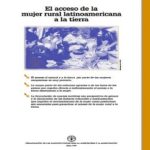El acceso de la mujer rural latinoamericana a la tierra
Como fruto de esta división del trabajo socialmente reconocida y aceptada, las mujeres rurales se enfrentan cotidianamente a un sinnúmero de obstáculos para llevar a cabo las actividades productivas, con miras a asegurar la subsistencia de sus familias. De hecho, barreras de orden jurídico, sociocultural e institucional limitan el acceso de las agricultoras a la tierra, así como su control sobre ella.





